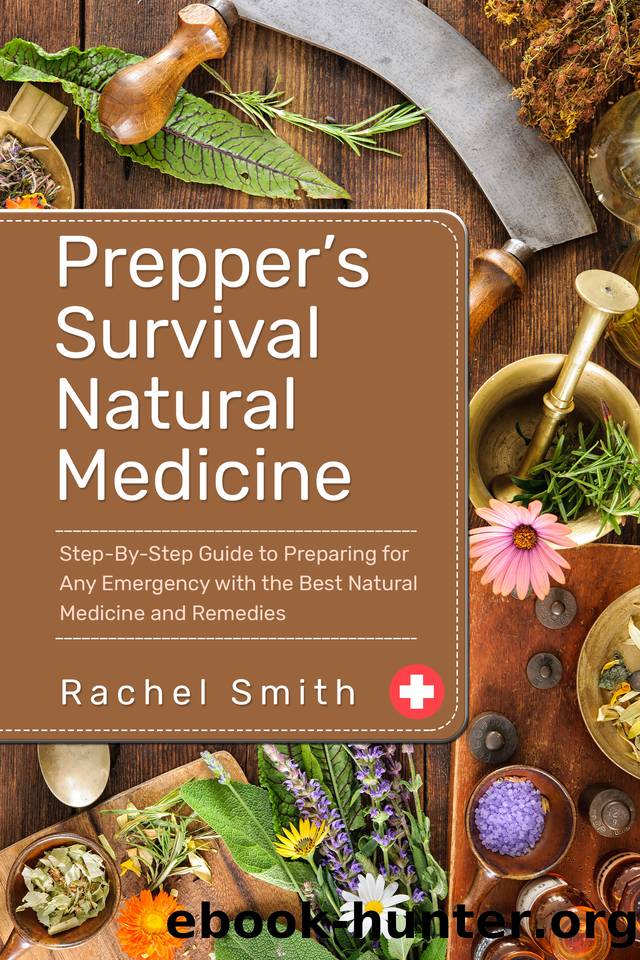Prepperâs Survival Natural Medicine: Step-By-Step Guide to Preparing for Any Emergency with the Best Natural Medicine and Remedies by Smith Rachel

Author:Smith, Rachel [Smith, Rachel]
Language: eng
Format: epub
Published: 2021-11-14T00:00:00+00:00
This is the best herb to deal with congestion or any other feeling of tightness in the chest. It can also be used to treat respiratory infections. Start consuming hyssop infused tisane the moment you notice the first signs of respiratory infections. Important to note, when it comes to recovering from an illness or an infection, you must give your body sufficient rest. If you do not give it the rest needed, herbal remedies will not work as intended. Apart from providing respiratory relief, it also acts as an effective topical analgesic. You can use it to treat bruises too. This is not an ideal herb for a pregnant woman.
Juniper
Juniper belongs to the Genus Juniperus, and it includes a variety of species. The berries and leaves of the juniper plant are commonly used in natural medicine. This plant is believed to have antiviral, anti-fungal, and anti-bacterial properties and acts as an antiseptic too. It is a natural diuretic, has nephroprotective effects, and is believed to reduce inflammation. The powder of the dried berries can be used, essential oil can be extracted from the berries, berries or leaves can be added to decoctions, and dried tincture can be made using this plant material.
The juniper concoctions can be consumed in many ways. Tinctures can be consumed daily at a dosage of 20-30 drops. It can also be used as a wound powder and applied topically to the affected area, and the essential oil from juniper berries can be added to a nebulizer. It works brilliantly well for urinary tract infections, candida, and even kidney complaints because it acts as a local antibiotic. Juniper works well against some strains of bacteria such as staphylococcus, streptococcus, listeria, E. coli, and even salmonella. Its active ingredients also show desirable activity against tuberculosis. Most believe tuberculosis is a disease of the past, but that's not the case. Unless you are vaccinated for it, you will not be protected from the effects of tuberculosis. While dealing with such harmful conditions, having a few natural options is quite helpful.
All parts of this plant can be used to make a decoction that can be added to disinfectants. From wiping down counters to cleaning doorknobs and even medical instruments, juniper comes in handy. Its oil can be added to laundry, turned into a savage dragon, and even nebulized to deal with respiratory issues. The essential oil in the form of lotion or salve can be massaged into muscles and joints to relieve aches and soreness.
Juniper should not be used during pregnancy, and long-term use of it, especially internal use, is not advisable.
Lavender
The scientific name of lavender is Lavandula, and the flowers of this plant are used to create natural medicine and remedies. Lavender not only smells good but also offers a variety of health benefits. Lavender has anti-bacterial, fungal, and antiviral properties. It acts as a decongestant, is hypertensive, mildly sedative, and has analgesic properties too. Lavender flowers can be used to make essential oil, infused oil, and tisane. There are no hard and fast rules about the dosage of lavender, and you can use it as much as you want.
Download
This site does not store any files on its server. We only index and link to content provided by other sites. Please contact the content providers to delete copyright contents if any and email us, we'll remove relevant links or contents immediately.
| Acupuncture & Acupressure | Aromatherapy |
| Ayurveda | Chelation |
| Chinese Medicine | Energy Healing |
| Healing | Herbal Remedies |
| Holistic | Homeopathy |
| Hypnotherapy | Massage |
| Meditation | Naturopathy |
| Reference |
Inner Engineering: A Yogi's Guide to Joy by Sadhguru(6785)
The Power of Now: A Guide to Spiritual Enlightenment by Eckhart Tolle(5760)
Fear by Osho(4728)
Ikigai by Héctor García & Francesc Miralles(4247)
The Art of Happiness by The Dalai Lama(4125)
The Ultimate Bodybuilding Cookbook by Kendall Lou Schmidt(3939)
Yoga Therapy by Mark Stephens(3742)
The Little Book of Hygge by Meik Wiking(3687)
The Healing Self by Deepak Chopra(3568)
Why Buddhism is True by Robert Wright(3447)
The Hatha Yoga Pradipika (Translated) by Svatmarama(3329)
Being Aware of Being Aware by Rupert Spira(3272)
Shift into Freedom by Loch Kelly(3194)
Wild Words from Wild Women by Stephens Autumn(3149)
Work Clean by Dan Charnas(3116)
Happiness by Matthieu Ricard(3040)
More Language of Letting Go: 366 New Daily Meditations by Melody Beattie(3024)
Yoga Body & Mind Handbook by Jasmine Tarkeshi(2874)
Why I Am Not a Feminist by Jessa Crispin(2748)
